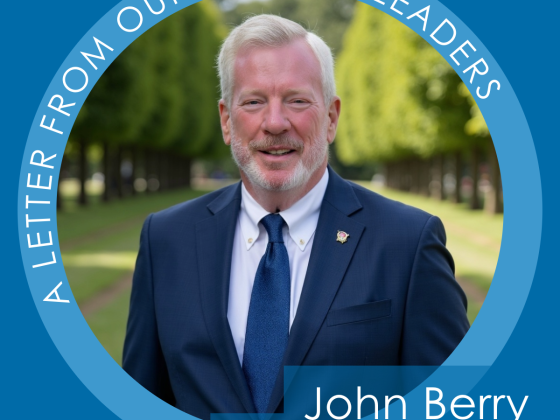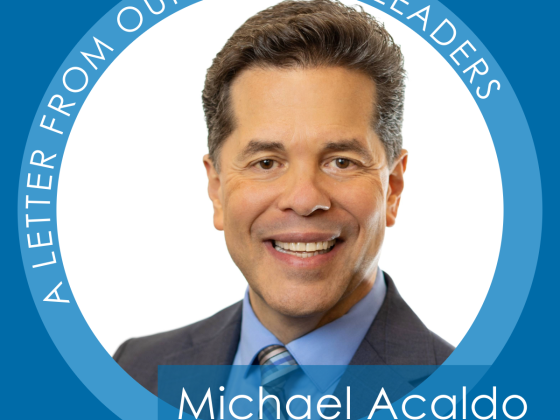Recently, at the Midwest Regional Meeting, I had the great pleasure of meeting and listening to The Most Reverend William Joensen, Ph.D, the Bishop of Des Moines, Iowa. In his after-dinner remarks, Bishop Joensen spoke about Frédéric Ozanam and the idea of “charitable disruption.” It was a fascinating talk (as you would expect from a former University Philosophy Professor)!
I think, in these challenging times, it’s proper and important to reflect on charitable disruption and what it means in relation to our mission as Vincentians and charitable volunteers driven by a commitment to Catholic Social Teaching.
But I want to go a step further and talk today about two powerful concepts that have shaped the very essence of charitable work: Charitable Disruption and Good Trouble. These are not mere terms, but foundational principles that guide us in serving those in need.
Charitable Disruption, as espoused by Blessed Frédéric, is a call to action. It is not enough to provide for the immediate needs of the poor; we must also address the systemic issues that perpetuate poverty. Ozanam recognized that charity must go beyond the act of giving. He said, “Charity is the Samaritan who pours oil on the wounds of the traveler who has been attacked. But it is justice’s role to prevent the attacks.”
This profound statement encapsulates the dual nature of our mission: to heal and to protect.
In the same vein, Good Trouble, a term coined by the late Rep. John Lewis, a stalwart of the civil rights movement, encourages us to question and challenge the status quo when it perpetuates injustice. Lewis believed that getting into Good Trouble was necessary for the advancement of society as a whole. It is a reminder that sometimes, to do what is right, we must be willing to disrupt the peace. Lewis used Good Trouble to describe the necessary and righteous actions taken to confront injustice.
Lewis believed that sometimes, in order to create a more just and equitable society, we must be willing to disrupt the status quo and challenge unjust systems. Good Trouble is about standing up for what is right, even when it is difficult or unpopular.
Both concepts are intertwined in their call for proactive engagement in the fight against injustice. They urge us not to be passive bystanders — but active participants in the quest for a more equitable world. As Vincentians we embody these principles through our efforts. We provide not only material assistance but also companionship, hope, and love.
Charitable Disruption and Good Trouble are not easy paths to tread. They require courage, conviction, and a deep sense of faith. They ask us to look beyond our comfort zones and to take risks for the greater good. But remember, as Vincentians, we are the hands and feet of Christ. We are the modern-day Samaritans, pouring oil on the wounds of society and standing up to prevent further harm.
Blessed Frédéric founded the Society with a vision of transforming society through acts of charity. Ozanam believed that charity was not merely about giving alms, but about addressing the root causes of poverty and injustice. He saw charity as a form of disruption — a way to challenge the status quo and bring about systemic change.
Ozanam’s concept of charitable disruption calls us to go beyond the surface level of charity. It urges us to engage with the marginalized, to understand their struggles, and to advocate for their rights. This form of charity is not passive; it is active and transformative. It disrupts the complacency of society and calls for a deeper commitment to justice and solidarity.
Lewis’s message of Good Trouble aligns closely with Ozanam’s vision of charitable disruption. Both call us to be courageous in our pursuit of justice and to recognize that true charity involves challenging the structures that perpetuate inequality and suffering. Good Trouble is not about causing chaos for its own sake; it is about creating constructive change that uplifts and empowers the oppressed.
At their core, both charitable disruption and good trouble are about love in action. They remind us that charity is not just about alleviating immediate needs but about addressing the systemic issues that create those needs. They call us to be proactive, to seek out opportunities to make a difference, and to be willing to take risks for the sake of justice.
As Catholics, we are called to embody these principles in our work. We are called to be disruptors of injustice and creators of Good Trouble. This means not only providing direct assistance to those in need — but also advocating for policies and practices that promote social justice. It means listening to the voices of the marginalized and standing in solidarity with them.
Why are these concepts so integral to our work? Because true charity is about more than just meeting immediate needs; it is about transforming lives and communities. When we engage in Charitable Disruption and Good Trouble, we are working to create a world where everyone has the opportunity to thrive.
Charitable Disruption and Good Trouble remind us that our faith calls us to action. They challenge us to move beyond our comfort zones and to be bold in our pursuit of justice. They remind us that charity is not just about what we give but about how we live our lives in service to others.
So, what can we do to put both these concepts into practice?
- Educate Ourselves. To effectively engage in charitable disruption and Good Trouble, we must first educate ourselves about the issues facing our communities. This means listening to the experiences of those who are marginalized and learning about the systemic factors that contribute to their struggles.
- Advocate for Change. Charity is not just about direct service; it is also about advocacy. We must use our voices to speak out against injustice and to advocate for policies that promote equity and inclusion.
- Build Relationships. True charity is rooted in relationships. We must take the time to build genuine connections with those we serve, recognizing their dignity and worth.
- Be Courageous. Engaging in Charitable Disruption and Good Trouble requires courage. We must be willing to take risks and to stand up for what is right, even when it is difficult.
- Reflect and Pray. Our work must be grounded in prayer and reflection. We must seek God’s guidance and strength as we strive to live out our call to charity and justice.
Let us be inspired by the lives of Ozanam and Lewis. Let us be disruptors of charity in the sense that we challenge ourselves and others to go beyond mere giving. Let us get into Good Trouble by advocating for policies and practices that uplift the marginalized. And let us do so with the love and compassion that is the hallmark of our faith.
In closing, I encourage each of you to continue your noble work with renewed vigor. May you find strength in the knowledge that your actions are a testament to the power of faith in action. May you always carry with you the spirit of Charitable Disruption and Good Trouble, knowing that through them, you are truly serving Christ.
Thank you for your dedication, your compassion, and your willingness to serve.
Peace and God’s blessings,
John



Great reflexión.